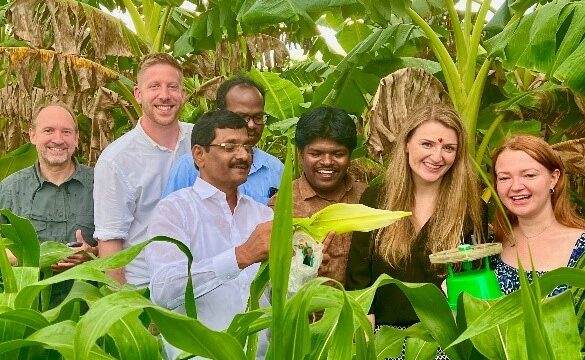
By Malvika Chaudhary
Fall armyworm (Spodoptera frugiperda), is a dangerous trans boundary insect with a high potential to spread rapidly due to its natural distribution capacity and opportunities presented by international trade.
Fall armyworm (FAW) arrived on the Indian subcontinent in May 2018. It has now spread across India, Nepal, Bangladesh, Sri Lanka and is approaching more beyond South East Asia.
Its strong flying capacity, climate adaptability and wide host range, makes the pest a better colonizing agent than other species of armyworms. Despite maize being primarily infested in this region – where it could complete its life cycle – random infestations on sugarcane, sorghum, cotton and cabbage have already been reported from India, Bangladesh and Sri Lanka.
Farmers need significant support to manage FAW sustainably in their cropping systems through Integrated Pest Management (IPM) activities. There is also still an urgent need to continue to generate widespread awareness and to empower the farming communities with knowledge of the pest, along with suitable technologies/management practices for its sustainable management in this region.
The exchange of information is especially important within this region. Indeed, it will be very much helpful for researchers as well as extension workers to combat FAW cost-effectively. With the COVID-19 travel restrictions currently in place, a half-day virtual conference among South Asian Association for Regional Cooperation (SAARC) member states recently took place to discuss the very latest on the joint efforts to mitigate this devastating pest.

The objectives of the conference were to share the challenges and achievement of FAW related works among the SAARC countries – Afghanistan, Bangladesh Bhutan, India, the Maldives, Nepal, Pakistan and Sri Lanka – and present the latest scientific results on all aspects of IPM research on the pest.
A special focus was made on the status of biological control and other environmentally sound strategies for FAW management. It also aimed to develop a SAARC FAW networking group through SAC and form a regional recommendation.
Along with international organizations like the FAO, CIMMYT and CABI, SAC (SAARC Agriculture Centre) invited officials working directly in FAW related projects – from research institutes, academicians, extension service and the private sector – among the SAARC member countries.
Dr Roger Day and Dr Malvika Chaudhary respectively presented CABI’s initiatives in the South Asia region under CABI’s Action on Invasive programme globally – but more specifically in the South Asia region.
Recommendations from the conference was to strengthen surveillance, research and extension, of FAW on maize and potential non-maize host crops while developing biologically intensive IPM programmes against the pest.
The forum strongly supported the evolution of national FAW task forces into standing cross-sectorial invasive pest species and the communication of uniform FAW management recommendations.
The task forces would also advocate the use of appropriate seed treatment, the signing of bilateral and/or multilateral Memorandums of Understanding (MoUs) among SAARC Member States for the exchange of information and capacity building and bio-control agents in line with the Nagoya Protocol on Access and Benefit Sharing (ABS).
Amongst other viable solutions for stable FAW tolerant/resistant genotypes, biocontrol was recognized as an important component of IPM. The development of mass production protocols for biopesticides – and the multiplication of bioagents at the community level and above – was seen as prime activity moving forward. This includes the harmonization of registration of biopesticides and emergency licensing of bio-agents across the region.
Additional information
Main image: Fall armyworm (Credit: CABI).
Find out more about CABI’s work in SAARC member countries from the India and Pakistan centre pages.
Since 2016 when the fall armyworm was confirmed in West Africa, CABU has been taking action against fall armyworm through our two key programmes: Action on Invasives and Plantwise and projects specifically on the pest. Our work includes international and national response planning, biological control research and development, mass extension and diagnostic services. Find out more here.
Related News & Blogs
Biological control in action: Zambia’s field days on fighting fall armyworm
Experts from CABI recently held two field days and an expo in Zambia, showcasing innovative approaches to pest management to 584 farmers, agro-dealers and other stakeholders to help raise awareness of approaches to tackle the invasive fall armyworm (Sp…
11 June 2025




